Vitamin K is an essential nutrient that plays a role in your blood’s clotting ability, helps strengthen your bones, and improves your cardiovascular health by preventing arteries from stiffening and calcifying.
While it’s found in green leafy vegetables, it can be hard for many people to get enough of them in their diet to keep their vitamin K levels high.
This is where a vitamin K supplement can be useful. If you want to take advantage of the bone strengthening and heart-health benefits, our research team has come up with the ten most effective vitamin K supplements on the market.
Research
Rankings
1. Zhou Nutrition K2 + D3
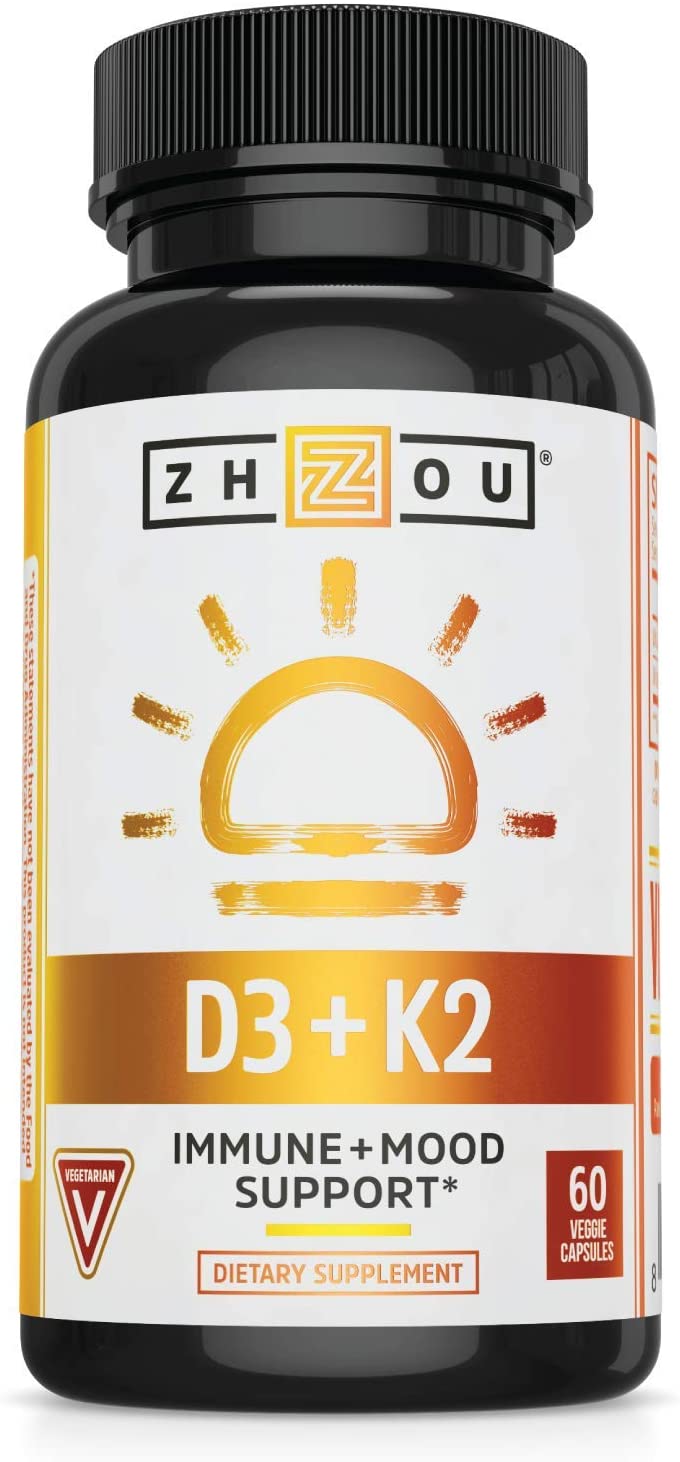
Zhou Nutrition exploits the synergy between vitamin D3 and vitamin K2 for optimal bone and heart health.
This supplement delivers 5000 IUs of vitamin D3, which should be enough even for people with darker skin who live in northern climates, as well as 90 mcg of vitamin K2.
For ensuring adequate vitamin K intake, it’s an excellent choice, thanks to its ultra-pure formulation: other than rice flour and cellulose to make up the capsule, there are zero additional ingredients.
2. Life Extension Super K with Advanced K2 Complex
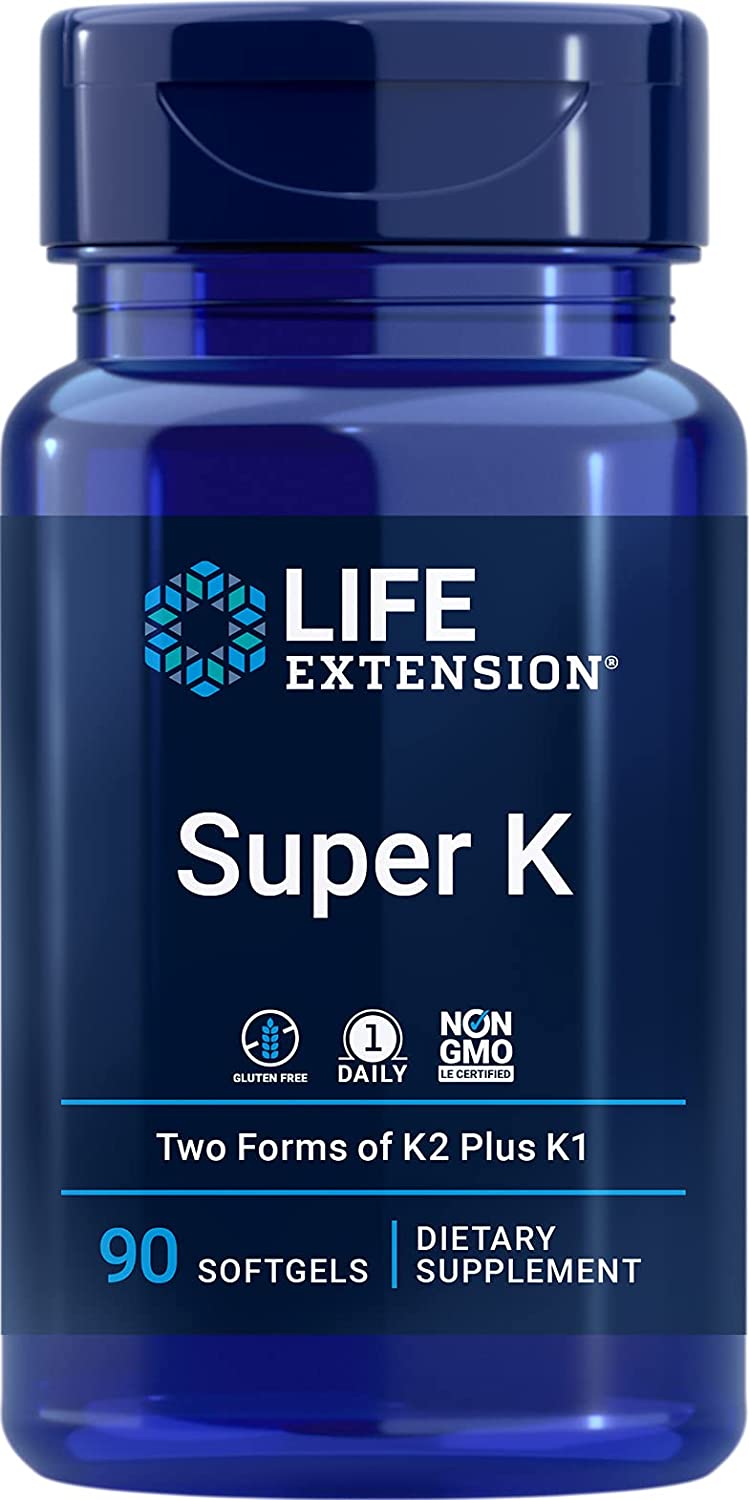
Life Extension includes three different forms of vitamin K in varying amounts, but the overall dosage is 2600 mcg—a very high dosage, which is even more effective thanks to the multiple forms of vitamin K present.
The vitamin K is also dissolved in olive oil, which will also aid bioavailability: vitamin K, unlike many other vitamins, is only soluble in fat, not water. If you are looking for a high-dose vitamin K supplement, this should be your top choice.
3. Peak Performance Advanced D+K
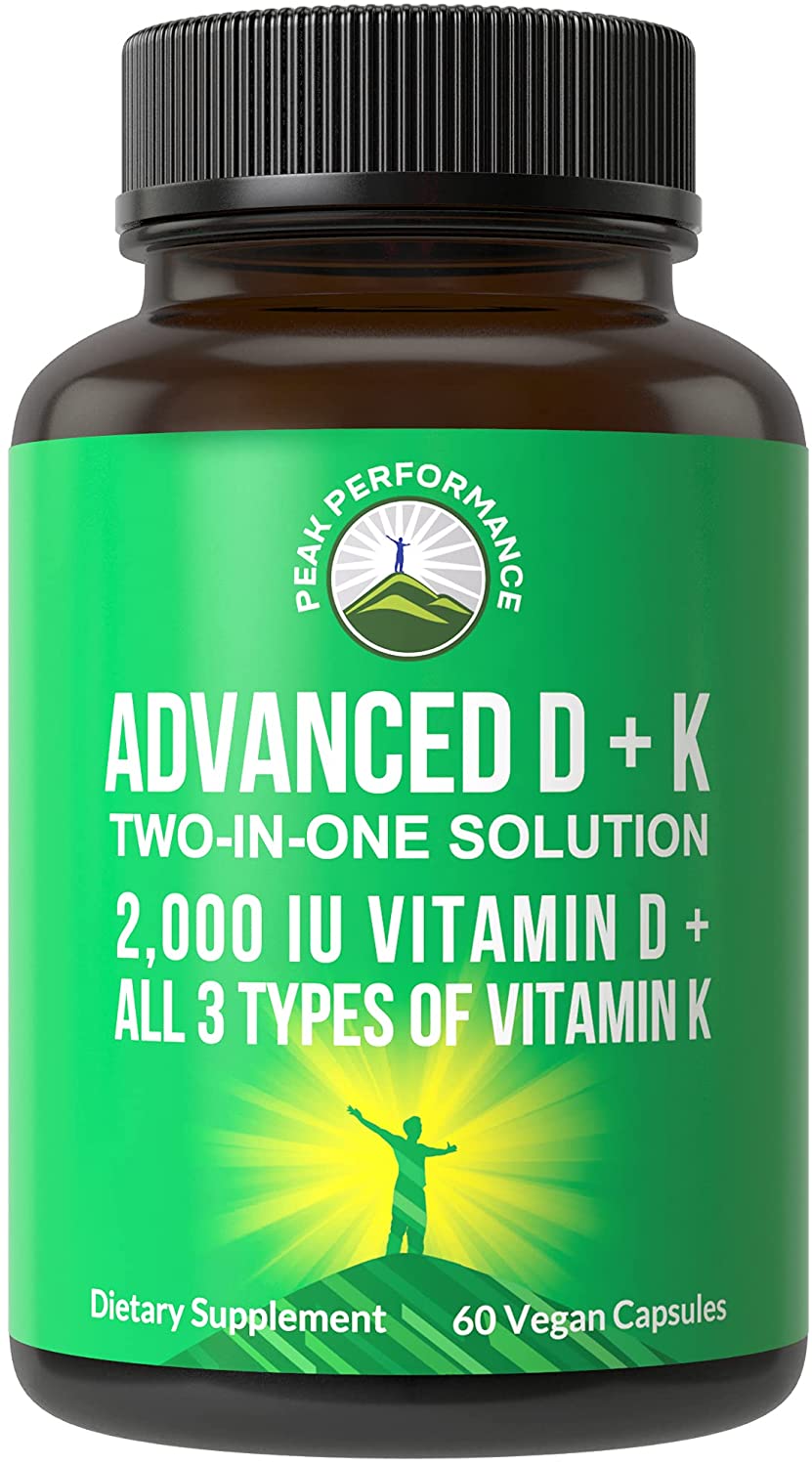
Peak Performance Advanced D+K uses a combination of 2000 IUs of vitamin D, plus three different forms of vitamin K, both K1 and two forms of K2. This comes alongside the black pepper extract BioPerine, which helps boost absorption, and it’s delivered in a clean and simple cellulose capsule. At 225 mcg per capsule, the dosage is just right for a lot of people.
4. Garden of Life Vitamin Code Raw K-Complex
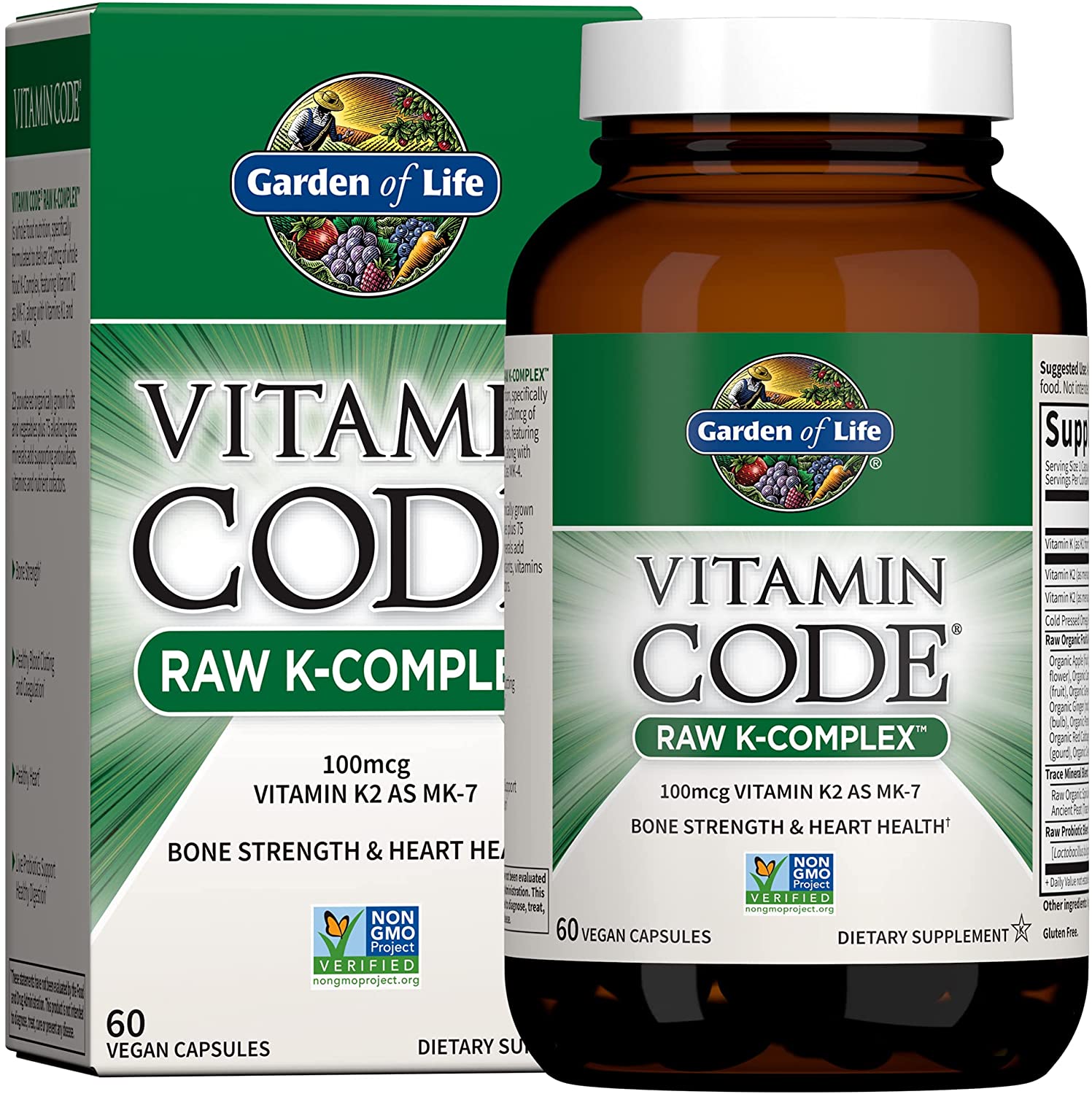
Garden of Life specializes in making supplements that include vitamins and minerals alongside the other phytonutrients present in the plants they come from.
Given that the foods richest in vitamin K are green leafy vegetables, Garden of Life delivers when it comes to supplying vitamin K along with the other nutrients you’d find in a natural source.
In addition to 120 mcg of vitamin K dissolved in cold-pressed flax oil, you’ll also get extracts from spinach, Brussels sprouts, kale, and a whole host of other fruits and vegetables. If you want a vitamin K supplement that takes a more holistic approach, this should be your choice.
5. Mary Ruth’s Vegan Vitamin K2 MK7 Drops
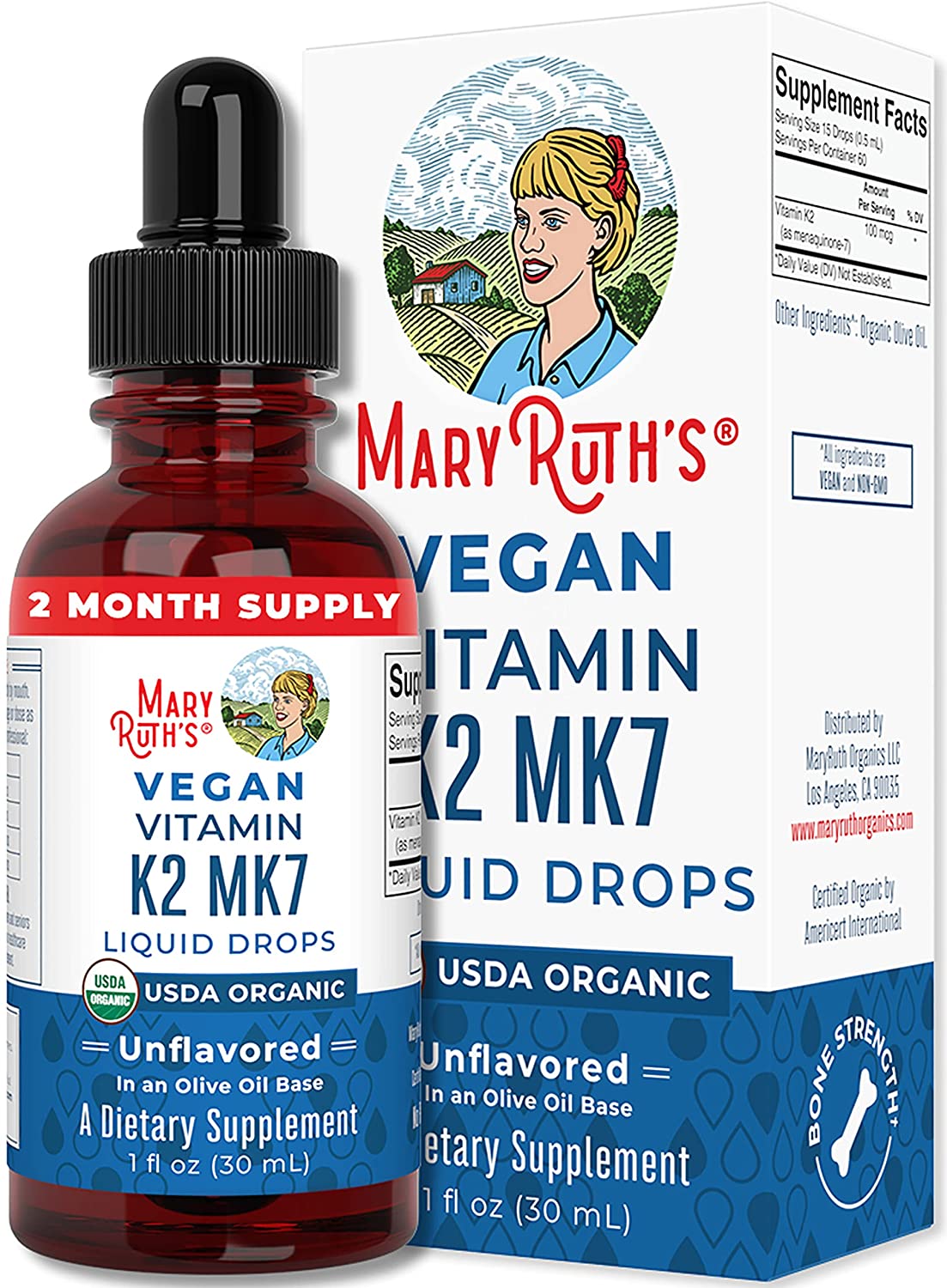
Mary Ruth’s makes the best liquid-format vitamin K supplement on the market. It’s dissolved in certified organic olive oil and is suitable either for topical application (directly onto your skin) or taking like a regular supplement, as a liquid or blended into a shake or smoothie.
The only reason it isn’t higher in the rankings is that most people are better-suited by capsule-based vitamin K. But for using on skin, it’s our favorite.
6. Bronson Vitamin K Triple Play
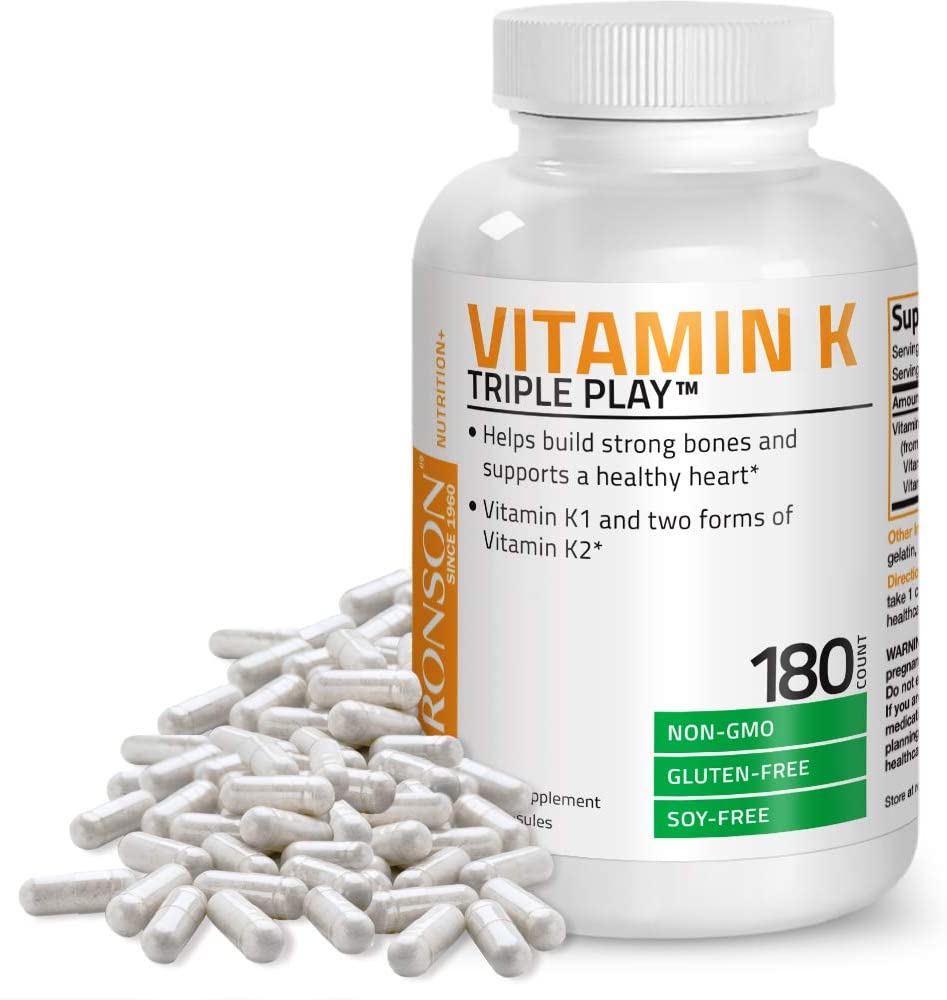
Bronson Vitamin K Triple Play is another take on the triple-sourced vitamin K combination. This isn’t the highest dose version on the market, but you’ll still get 550 mcg of vitamin K all together.
The capsules are gelatin-based, which won’t please strict vegetarians and vegans, but the bigger issue is the presence of fillers and additives that you won’t find in some other competitors. It’s not a dealbreaker; the vitamin K content is still good enough to make up for it.
7. NOW MK-7 Vitamin K-2
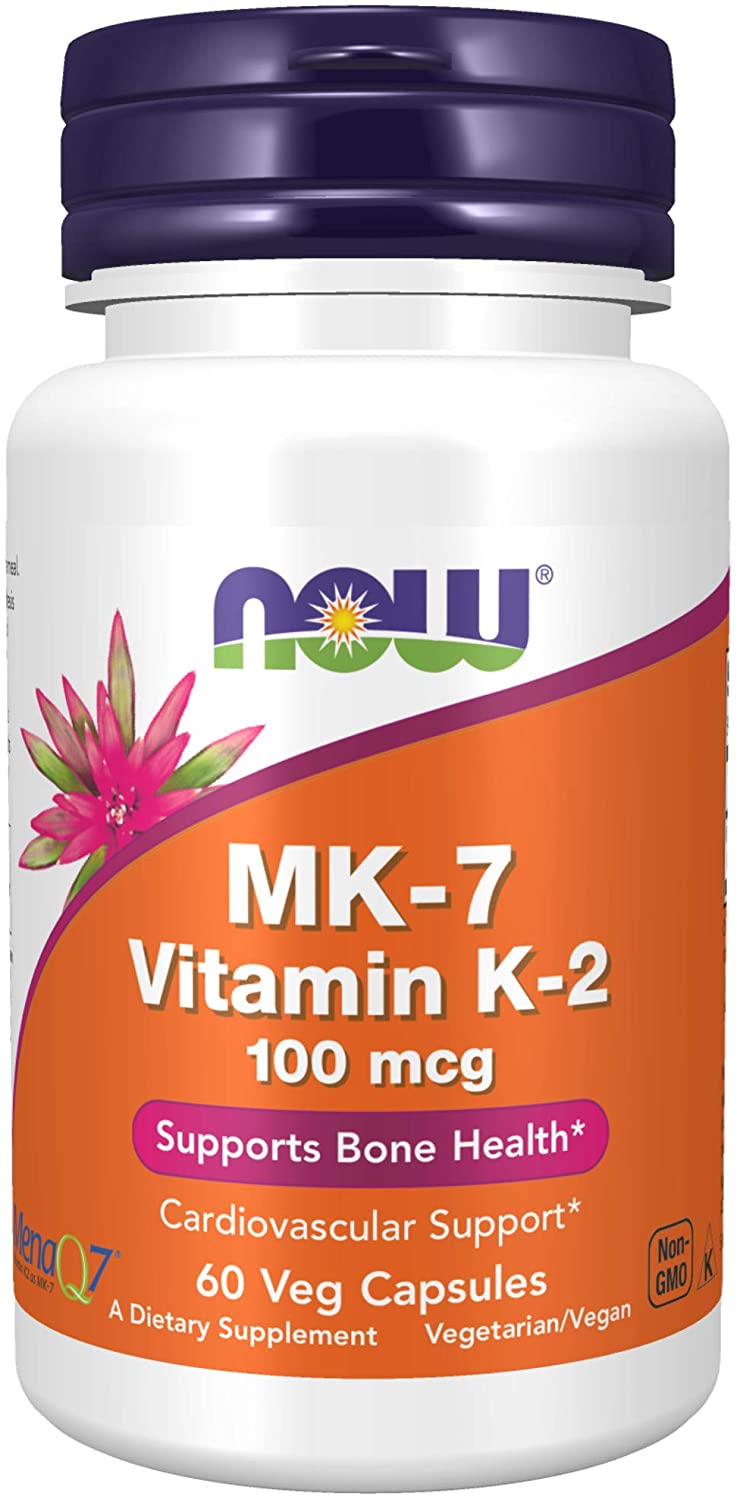
NOW MK-7 Vitamin K-2 is fairly middle of the road as far as ingredients and dosage. At 100 mcg of vitamin K2 per capsule, it’s adequate but not stellar.
The ingredients are reasonably simple, though the cellulose-based capsules could probably do without silica. While NOW MK-7 Vitamin K-2 doesn’t stand out in any particular way, it’s still a reasonable choice for a lower-dose vitamin K2 supplement.
8. Jarrow Formulas MK-7
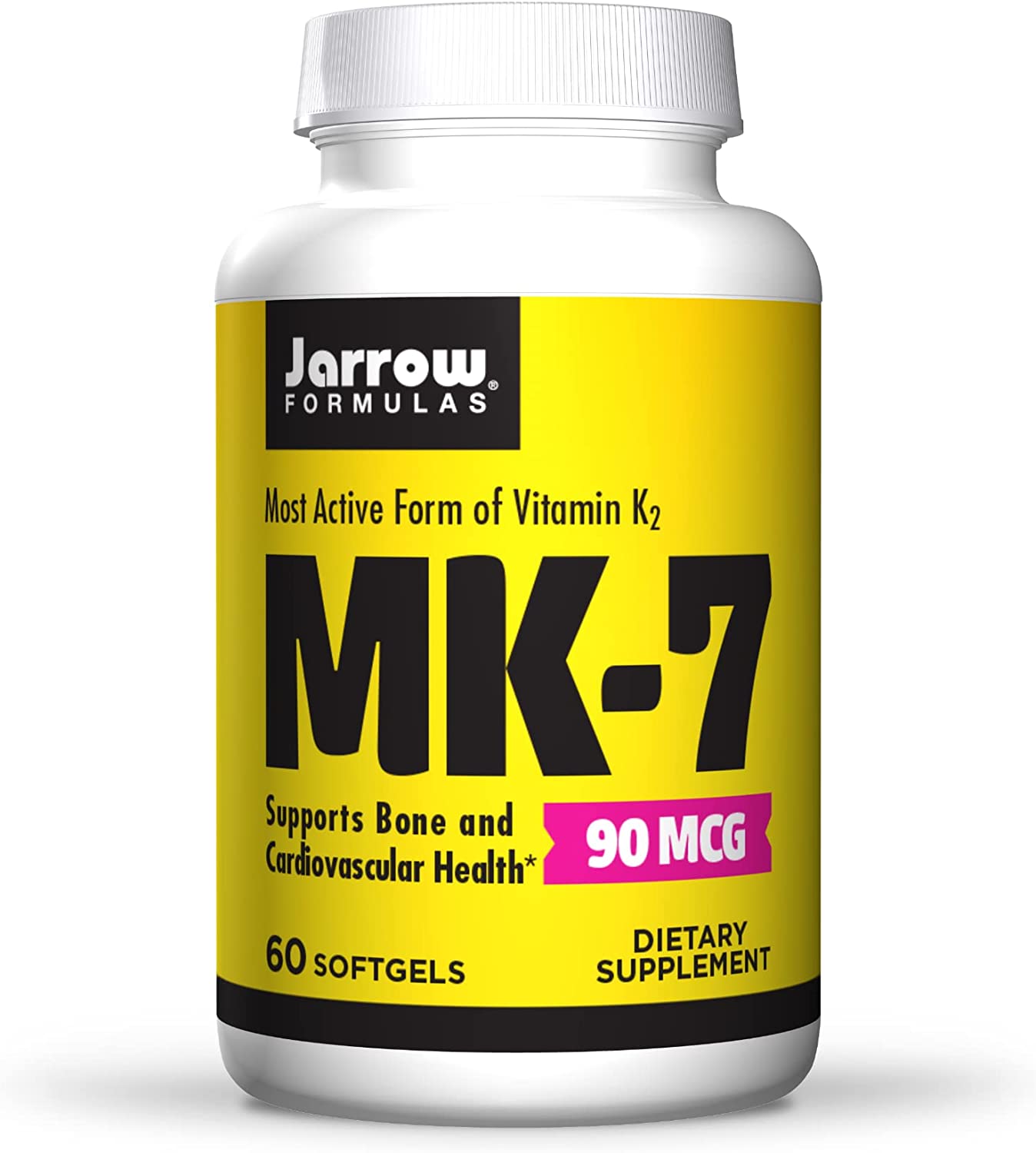
Jarrow Formulas takes a bit of a different tack with their MK-7 supplement. It uses vitamin K2 derived from natto, a fermented form of soybeans, which is a more bioactive source of vitamin K.
The dosage itself is not particularly high, at 90 mcg per capsule. While it’s good to see the supplement dissolved in oil, the low dose makes it hard to rank higher. Still, Jarrow Formulas MK-7 isn’t a bad choice, but isn’t the best either.
9. Puritan’s Pride Vitamin K
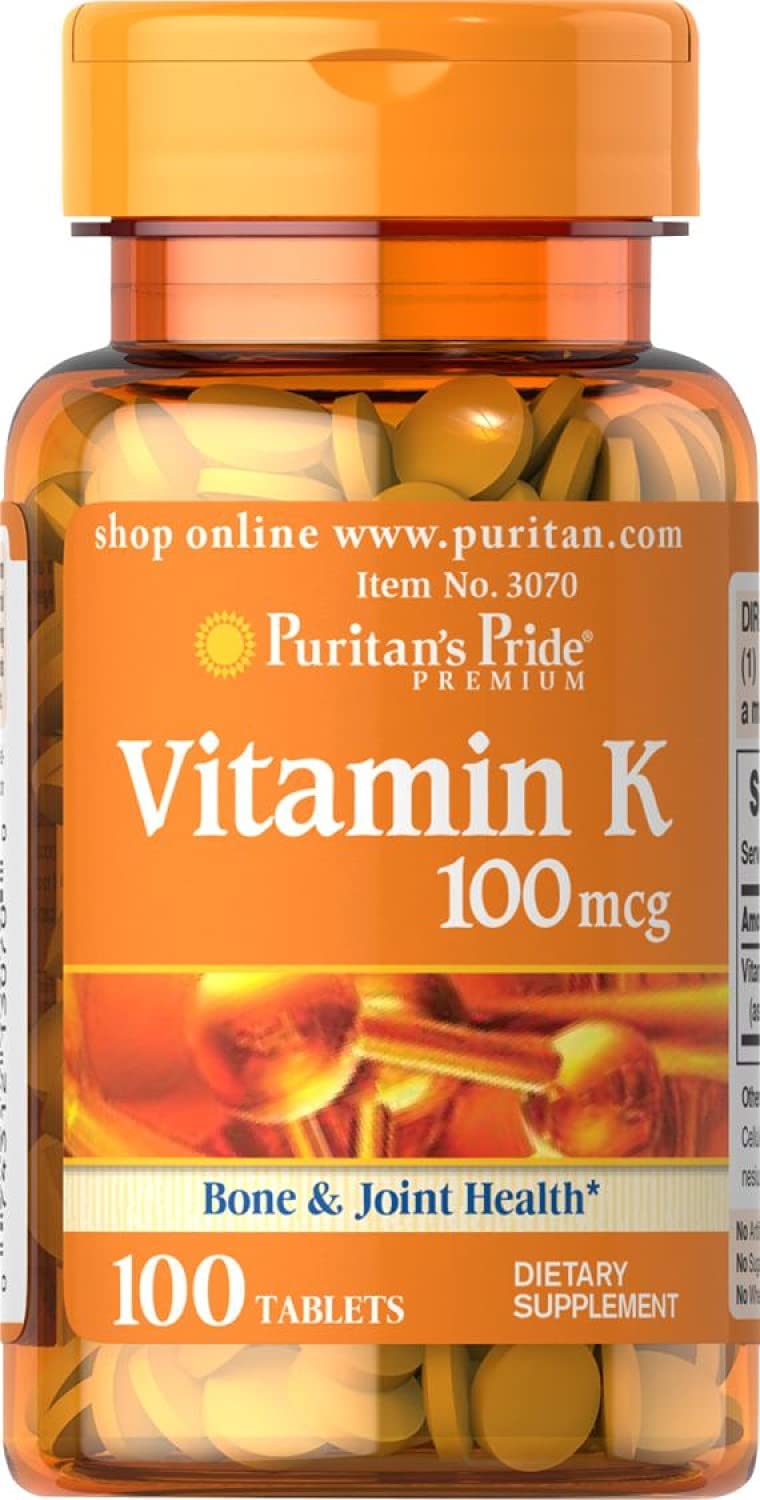
Puritan’s Pride makes a pretty basic vitamin K supplement. It delivers 100 mcg per tablet, in phytonadine form (K1). The presence of a few binders and fillers isn’t to the liking of supplement purists, but that aside, it’s still an okay choice.
10. Bluebonnet Vitamin K1
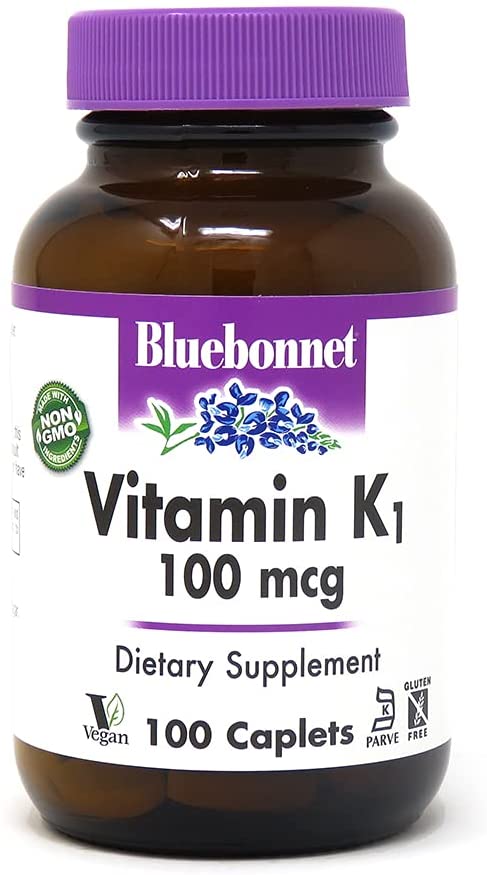
Bluebonnet makes a pretty basic vitamin K supplement. The dosage, 100 mcg, is not very high, and moreover, the capsule contains a lot of binders and fillers. For these reasons, most people will be better served with a different vitamin K supplement.
Category winners
Best vitamin K overall: Zhou Nutrition K2 + D3
Whether for heart, bone, or connective tissue health, Zhou Nutrition is a fantastic pick. Its combination of vitamin D3 and vitamin K provides a synergistic boost to absorption, and the clean supplement formulation means there are no extraneous ingredients to worry about.
Best vitamin K for heart health: Life Extension Super K
Life Extension makes a powerful, high-dosage vitamin K supplement that provides three different forms of vitamin K (K1, K2, and K3) for maximum bioavailability. This precision formulation makes it a great choice for maximizing the cardiovascular health benefits of vitamin K.
Best vitamin K for skin: Mary Ruth’s Vegan Vitamin K2 MK7 Drops
Vitamin K isn’t just used for heart and bone health. It’s also a common remedy for spider veins and skin bruises. Mary Ruth’s is a great brand that makes a double-duty liquid vitamin K supplement that’s equally well-suited for taking as an oral supplement or applying directly to skin.
Best vitamin K for bone strength: Zhou Nutrition K2 + D3
Vitamin D is essential for bone health, but its biological activity is significantly enhanced by vitamin K. That’s why Zhou Nutrition’s K2 + D3 formulation is our pick for bone strength—by leveraging the effects of both vitamins together, it acts to fight the loss of bone density that causes osteopenia and osteoporosis.
Best vitamin K with vitamin D: Zhou Nutrition K2 + D3
Zhou Nutrition carefully balances the vitamin D3 and vitamin K2 content of this supplement for maximum bioavailability. For that reason, it’s our favorite choice if you are taking vitamin K to augment the efficacy of vitamin D supplementation.
Best liquid vitamin K: Mary Ruth’s Vegan Vitamin K2 MK7 Drops
Need a liquid-form vitamin K supplement? Mary Ruth’s is far and away the best option. Delivering pure vitamin K2 in organic olive oil, it’s an excellent way to use vitamin K on bruised or scarred skin, or as a treatment for varicose veins. It’s also suited for internal use too, so if you want to add vitamin K to a shake or smoothie, it works just as well.
Who should buy vitamin K?
Vitamin K is mainly comprised of vitamin K1 and K2, with vitamin K1 being the main form in vitamin K supplements. It is great for people looking to improve bone strength, artery health, and bone health – especially when used with vitamin D3. While there have been reports of people using it to treat cancer, more research is needed as there is nothing proving this to date.
People that take Coumadin for bleeding disorders or heart problems should avoid vitamin K unless otherwise directed by a healthcare provider. If you are taking any drugs such as antibiotics, blood thinners, or chemotherapy, you should also avoid vitamin K as they may be affected by it.
How we ranked
Since vitamin K comprises of multiple forms, we first looked at the type included in each supplement. We preferred vitamin K1 and K2 over other forms, as these seem to be the most effective. In terms of forms, we did not reward versions such as MK-4 or MK-7 since research is still inconclusive about what is best.
Next, we looked at bioavailability. Since vitamin K2 is fat-soluble, we were pretty specific about what we wanted to see. We preferred products like Garden of Life and Life Extension that included some sort of fat in their product to help with absorption. Products like Peak Performance also ranked well for including BioPerine – which has been shown to drastically increase the bioavailability.
A final item we considered was the purity. We preferred products that included limited fillers and binders and penalized those, like Doctor’s Best, that did. Our top choice, Zhou Nutrition, includes both vitamin and D3 for better absorption and effectiveness in the body. With basically no fillers and a healthy dose, it’s pretty clear why this is our top choice.
Benefits
The MK-7 form of vitamin K2 is more effective than the K1 form. In the early days of vitamin K supplements, most products used the synthetic “K1” form of the vitamin.
As nutritionists started to understand the natural biochemistry of vitamin K better, they were able to derive the MK-7 form, usually directly from plant sources like soybeans.
A 2005 scientific article in Blood, a scientific journal run by the American Society of Hematology, investigated the efficacy of both the K1 and MK-7 forms of vitamin K (1).
In the study, healthy volunteers took similar doses of either a K1 or an MK-7 vitamin K supplement. The researchers then observed how much vitamin K was absorbed, and how long blood levels of vitamin K stayed elevated.
Both supplements were absorbed equally well, but the MK-7 form of vitamin K led to blood levels that stayed elevated for much longer.
This suggests that if you are aiming to keep your body’s reserves of vitamin K high, a supplement that incorporates the MK-7 form will be better than one that is purely K1-based.
Still, some manufacturers believe there are advantages to the K1 form, which is why you’ll see many combination K1/MK-7 supplements on the market. The efficacy of K1, though, remains unproven compared to the MK-7 form.
Vitamin K can improve the health of your arteries. One of the major causes of cardiovascular disease is the stiffening and calcification (literally, the formation of calcium deposits) of the major arteries of your body.
As these arteries become harder and less elastic, your blood pressure increases, and arterial stiffness often goes hand in hand with thickening of the artery walls. All of these can lead to heart disease.
Vitamin K, however, appears to be a very effective way to reduce arterial thickness, according to a clinical trial published by researchers in the Netherlands in the journal Thrombosis and Haemostasis (2).
In the study, the authors randomly assigned 244 older women to either a placebo supplement or an MK-7 vitamin K supplement (180 mcg per day). Unlike many supplement trials, the follow-up period in this study was quite long, at three full years.
The researchers used advanced imaging techniques to objectively measure the stiffness of the aorta, the biggest artery coming out of the heart.
After the study’s data had been analyzed, the researchers found that the arteries of the women on the vitamin K supplement had significantly improved compared to the women in the placebo group, along with biomarkers indicative of better arterial health.
Vitamin K could improve your bone strength. Vitamin K plays a number of roles in biochemical processes linked to bone synthesis, so researchers naturally wondered whether vitamin K intake was linked to bone strength.
A 2008 study in the Journal of Clinical Endocrinology & Metabolism set out to determine whether vitamin K played a role in bone strength (3). In the study, researchers at Tufts University reviewed the dietary intake of vitamin K among people enrolled in a large cohort study.
They attempted to find any evidence for a connection between vitamin K intake and either bone density or hip fracture, which is associated with poor bone strength.
The researchers found that the vitamin K supplement did not result in a significant increase in bone density, but it did result in fewer hip fractures. This is in line with other findings that indicate that vitamin K does not necessarily increase bone density by itself (4).
However, bone density is not the whole story when it comes to bone strength: bones of the same density can have micro-architecture that is organized in a better or worse fashion for strength, so vitamin K may have more to do with how bone tissue is organized versus its bulk density.
Vitamin K works in conjunction with vitamin D to improve bone health. While the synergistic effects of vitamin D and calcium for improving bone strength are well-known, the influence of vitamin K in this process has been less-publicized.
A study published by researchers at CHA University in Korea in 2011 examined the specific effects of vitamin D and vitamin K in combination in a calcium supplement to improve bone density in older women (5).
Over the course of three months, the researchers demonstrated that the calcium plus vitamin D3 plus vitamin K supplement outperformed the calcium-only supplement in terms of increasing bone mass density in the lower back of the women in the study.
If you are specifically using vitamin K for bone health, you should definitely be taking it in conjunction with both calcium and a high dose of vitamin D.
Side effects
Vitamin K is a fat soluble vitamin, which typically means that there is a higher risk of toxicity from extremely high doses, since your body can’t eliminate it as easily as a water soluble vitamin like vitamin C.
However, in the case of vitamin K, no risks have been established in healthy people even at very high vitamin K intake levels, according to the National Institutes for Health’s Office of Dietary Supplements (6).
However, vitamin K does interact with a few medications, most notably warfarin and other blood thinners. Because vitamin K plays an important role in the blood clotting process, it can interfere with the activity of drugs that are supposed to thin your blood.
As such, anyone on blood thinners should talk to their doctor before taking a vitamin K supplement.
Recommended dose
The minimum recommended intake of vitamin K for optimum health is 120 mcg per day for men and 90 mcg per day for women (7).
This is in line with what you’ll find in lower dose vitamin K supplements, but many clinical trials use doses closer to 200 mcg per day. A few have gone higher, to 500 mcg per day, with some success.
For ensuring continued heart health and bone strength, 90 to 125 mcg should be adequate, but if you are looking to correct a deficiency or actively increase bone strength or improve your heart health from where it already is, a higher dose might be necessary. The heart health study performed in the Netherlands, for example, used 180 mcg per day.
FAQ
What is vitamin K? Vitamin K is a compound found naturally in green leafy vegetables that can be taken as a supplement to improve heart health and bone strength, particularly when combined with vitamin D3.
It’s a vitamin whose uses are fairly narrow, but have been studied in-depth, and the mechanism of its effects are fairly well-understood.
What happens if I am allergic to vitamin K? Allergies to vitamin K are very infrequent, but they do occur. If you have trouble breathing, develop a rash, become extremely dizzy, or experience swelling around your face and throat, please seek immediate medical attention.
How do I know that Vitamin K is right for me? Having a Vitamin K deficiency is rare, as most people receive an adequate amount through their diet if it’s healthy and balanced. Bacteria that live in the colon actually produce small amounts of Vitamin K that your body then reabsorbs. You might be at risk for a Vitamin K deficiency if you did not receive a Vitamin K injection at birth. If you suffer from cystic fibrosis, colitis, celiac disease, or short bowel syndrome, you are at higher risk. You could also be at risk if you’ve had weight loss surgery. If you don’t get enough Vitamin K, you may have problems with bruising, bleeding, and your blood taking a longer time to clot. You could also have reduced bone strength and an increased risk of osteoporosis. If you think Vitamin K might be right for you, talk to your doctor before taking a new supplement.
Does Vitamin K help people who have problems with blood clots? Vitamin K is essential to the body to help the blood clot. If you experience issues with this, a supplement of Vitamin K might be right for you. Please discuss any new supplements with your doctor.
What happens if I take too much Vitamin K? If you are pregnant or breastfeeding, you should not be taking large amounts of Vitamin K without your doctors’ permission. An excess of Vitamin K if you have Kidney or Liver disease can be harmful. If you’re diabetic, you will need to monitor your blood sugar closely.
If you suspect you’ve taken a toxic amount of a Vitamin K supplement or you are feeling unwell after taking a large dose, please contact your doctor or go to your nearest hospital.
What is vitamin K? Vitamin K is a compound found naturally in green leafy vegetables that can be taken as a supplement to improve heart health and bone strength, particularly when combined with vitamin D3.
It’s a vitamin whose uses are fairly narrow, but have been studied in-depth, and the mechanism of its effects are fairly well-understood.
You can take Vitamin K orally or via injections. There are also some topical creams available.
Does Vitamin K help prevent bruising? Vitamin K may help to prevent bruising, but there is insufficient evidence to prove if that is conclusive.
Does Vitamin K help with heart disease? The increased dietary intake of Vitamin K2 has been linked to lowering the risk of heart disease, and death due to heart disease in those who are older. However, the vitamin isn’t linked to those who are at high risk for heart disease. Increasing Vitamin K1 intake from the diet has previously been linked to reducing the risk of death due to heart disease. Vitamin K1 supplements are linked to minimize and prevent coronary calcification advancement, which is one of the main risk factors for heart disease.
Can Vitamin K help depression? Vitamin K has been linked to reducing the symptoms of depression. Still, there is not enough evidence to support this in clinical trials. A Vitamin K supplement is not a suitable treatment for depression, and you should consult your doctor if you are looking for a treatment.
Will a Vitamin K supplement help my hair become healthy? Vitamin K is not directly linked to the health of hair, skin, or nails. However, dietary intake of Vitamin K comes from healthy foods like spinach, which can help boost the health of your hair.
Can I take a Vitamin K supplement if I am pregnant or breastfeeding? Vitamin K is likely safe for women who are pregnant or breastfeeding. However, your dosage should be suggested by a medical professional. Please contact your doctor if you’d like to start taking this supplement.
Can taking Vitamin K stop my menstrual cycle? While Vitamin K cannot stop a menstrual cycle, there is some evidence to suggest that it could help lessen the impact of a heavier menstrual flow. There is not enough evidence to suggest this, however, if you want to see if Vitamin K is a potential solution, please contact your doctor.
Should I take Vitamin K supplements if I am taking medications? The most significant drug interaction with Vitamin K is Warfarin, which is a medication used to slow blood clotting. Vitamin K directly counterbalances Warfarin, so it’s imperative they are not taken together. Certain antibiotics can react negatively with Vitamin K as they interact with the bacteria in the gut. Bile acid sequestrants reduce the absorption of Vitamin K, along with some over the counter weight loss pills.
If you are taking any other medications, you should still book an appointment with your doctor to determine if a Vitamin K supplement is right for you.
Should I take Vitamin K supplements if I am taking other supplements? There are no significant interactions between Vitamin K and other supplements, and you should always contact your doctor to ensure you’re not improperly combining supplements.
When is the Vitamin K shot given to newborns? All babies are required to get a Vitamin K shot at birth to prevent ‘Vitamin K Deficiency Bleeding,’ or ‘hemorrhagic disease of the newborn.’ Babies do not get a sufficient amount of Vitamin K while in the womb, and there’s not enough in breast milk to prevent VKDB. The risk of this runs until about six months of age, so they receive the shot immediately after birth. If you were to wait to see if they were at risk for VKDB, it might be too late. The shot is perfectly safe for newborns and contains an appropriate dose.
What are the best Vitamin K supplements on the market? There are a lot of great supplement brands to choose from, but a brand with an excellent reputation and that has been on the market for a while is a great choice. If you need help, please ask your doctor or pharmacist for their recommendation.
Some of the best selling supplements include NOW Supplements, Vitamin K-2 100 mcg, Menaquinone-4 (MK-4), NOW Supplements, MK-7 Vitamin K-2 100 mcg, Cardiovascular Support, Doctor’s Best Natural Vitamin K2 Mk-7 with Menaq7, Nature Made Vitamin K2 100 mcg, and Life Extension Bone Restore with Vitamin K2.
Is Vitamin K suitable for children? Since newborns receive a dose of Vitamin K directly out of the womb, it is safe for children. Vitamin K is found in many healthy foods, but if they require a supplement as directed by a doctor, it is safe. There are no dosage recommendations, but the adequate intake for infants 0-6 months old is 2 mcg. For infants aged 7-12 months is 2.5 mcg. Children who are 1-3 years old should take 30 mcg. Children 4-8 years old should take 55 mcg. Children who are 9-13 years old can take up to 60 mcg and adolescents aged 14-18, including pregnant and breastfeeding women should take up to 75 mcg.
When is the best time to take Vitamin K? Vitamin K is a fat-soluble vitamin, so the best time to take it with your dinner. Vitamin K dissolves in the body using fats, so including healthy fats into your meals will help break the vitamins down for usage in your body. When we get extra fat-soluble vitamins, the excess is stored in the liver, so a meal with healthy fats helps them be adequately absorbed.
Can Vitamin K help regulate my sleep schedule? Vitamin K is not linked to regulating the sleep-wake schedule.
How do I know if I am Vitamin K deficient? While Vitamin K deficiency can be rare, as we receive much of our daily dose from our diets, some apparent signs and symptoms manifest for Vitamin K deficiency. If you have a deficiency as an adult, you may experience excessive bleeding from wounds or injections sites or when you injure yourself, easy bruising from injuries, oozing from your nose or gums, extremely heavy menstrual periods, blood in your urine or stool, bleeding in the gastrointestinal tract, and increased prothrombin time. Vitamin K deficiency in newborns can manifest in similar ways, but in extreme cases, they can experience bleeding in the skull.
Those who are at risk of a Vitamin K deficiency include individuals who have chronic malabsorption or malnutrition conditions, those who have been on antibiotics for a prolonged period of time, and those who are seriously ill. Cancer or dialysis patients, or those with liver issues, can also be at a high risk for deficiency. Cystic fibrosis, colitis, celiac disease, or short bowel syndrome can also lead to a Vitamin K deficiency. If you have any of these symptoms, or you are in a high-risk category, please contact your doctor to discuss your options for supplementation. You should not be taking supplements of this nature without being tested for a deficiency first.
Related Articles
Recap
Vitamin K plays an important role in maintaining strong and healthy bones, especially when combined with vitamin D. It’s also effective for decreasing stiffness in your arteries and improving your cardiovascular health.
The most effective form of vitamin K appears to be the MK-7 form, because this naturally-derived variant keeps your blood levels of vitamin K elevated for longer.
The optimal dosage of vitamin K to get these benefits is between 90 and 200 mcg per day for most people, though no known risks have been associated with higher doses.
The only side effects to be aware of are the potential interactions with medications for blood thinning, like warfarin.
Though its applications are fairly narrow, vitamin K is a safe, effective, and easy way to improve both bone and heart health.
For BodyNutrition‘s #1 vitamin K recommendation, click here.